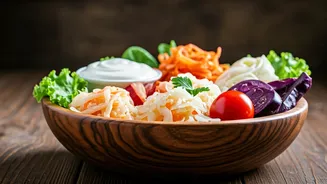Probiotics: What are they?
Probiotics are live microorganisms, typically bacteria and yeasts, that provide numerous health benefits when consumed. These beneficial microbes are crucial
for maintaining a healthy gut, also known as the gut microbiome. This complex ecosystem influences digestion, nutrient absorption, and immune function. By consuming probiotic-rich foods, you can enhance the diversity and balance of your gut flora, potentially leading to improved overall health and well-being. A healthy gut is now understood to be critical for the prevention of a wide array of diseases.
Benefits of Probiotics
The advantages of probiotics are extensive and varied. Primarily, they aid digestion by breaking down food and assisting in nutrient absorption. This can alleviate symptoms of digestive disorders, such as bloating, constipation, and diarrhea. Probiotics also strengthen the immune system by crowding out harmful bacteria and producing substances that fight off infections. Furthermore, a balanced gut microbiome is linked to improved mental health, reduced inflammation, and a lower risk of chronic diseases. Studies have shown that a healthy gut can also contribute to weight management by influencing metabolism and appetite.
Yogurt: A Classic Choice
Yogurt is one of the most well-known probiotic foods, readily available and widely consumed. It's produced by fermenting milk with live bacteria cultures, and the specific strains of bacteria vary depending on the brand and type. Look for yogurt that explicitly states "live and active cultures" on the label. Greek yogurt, in particular, is an excellent source of protein in addition to probiotics, making it a satisfying and healthy snack or meal component. You can consume yogurt plain, or combine it with fruits, nuts, or seeds for additional flavors and nutritional benefits. Regular consumption of yogurt supports healthy digestion and boosts the immune system.
Kefir: Yogurt's Cousin
Kefir is a fermented milk drink, similar to yogurt, but with a thinner consistency and a wider variety of beneficial bacteria and yeasts. It's made by adding kefir grains (which are not actually grains, but a symbiotic culture of bacteria and yeasts) to milk, resulting in a slightly tart and effervescent beverage. Kefir offers an even greater diversity of probiotics than yogurt, making it a powerhouse for gut health. This unique composition can lead to improved digestion, enhanced immunity, and reduced inflammation. Kefir can be enjoyed on its own, blended into smoothies, or used as a base for sauces and dressings.
Sauerkraut: The Fermented Cabbage
Sauerkraut, or fermented cabbage, is another excellent source of probiotics, offering a tangy and flavorful addition to your meals. It is made by fermenting finely shredded cabbage with lactic acid bacteria, which not only preserves the cabbage but also creates probiotics. The fermentation process generates probiotics, transforming plain cabbage into a superfood. While the prepackaged versions in the refrigerated section of your grocery store often maintain the live cultures, it is vital to check the label to make sure the sauerkraut hasn't been pasteurized, as this would kill the beneficial bacteria. Sauerkraut is a versatile ingredient that can be added to sandwiches, salads, or eaten on its own, providing a delicious way to support gut health.
Kimchi: Spicy and Beneficial
Kimchi, a traditional Korean side dish, is a spicy and flavorful fermented dish that packs a probiotic punch. Made from a combination of vegetables, typically napa cabbage, seasoned with chili peppers, garlic, ginger, and other spices, kimchi undergoes fermentation, producing beneficial bacteria. The variety of ingredients adds to its unique flavor profile, making it a vibrant addition to any meal. Kimchi is not only a tasty addition to meals but also a beneficial one. Similar to sauerkraut, it offers digestive benefits and can help boost the immune system. Consider using kimchi in various ways, such as in stir-fries, soups, or as a side dish.
Miso: Flavorful Fermented Soybean
Miso, a traditional Japanese seasoning, is a fermented paste made from soybeans, koji (a type of mold), and salt. This mixture undergoes a fermentation process that yields a rich, savory flavor and a wealth of probiotics. It is commonly used in soups, marinades, and sauces, adding depth and umami to dishes. The fermentation process allows for the creation of beneficial bacteria, making it an excellent addition to a health-conscious diet. Miso provides digestive support, improves the immune system, and contributes to overall gut health. Remember that miso is usually not heated after the fermentation process to preserve the probiotic content.
Pickles: Not All are Equal
Pickles can be a good source of probiotics, but it is important to choose the right kind. Traditional pickles are fermented in a brine of salt and water, which allows the growth of beneficial bacteria. These fermented pickles offer probiotic benefits. However, many commercially available pickles are made with vinegar, which inhibits the fermentation process and does not contain live probiotics. The best option is to look for pickles that are fermented, specifically stating that they contain live cultures on the label. Fermented pickles, when chosen carefully, can contribute to a healthy gut microbiome.




















